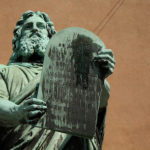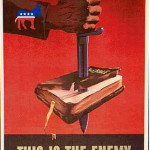We run our website the way we wished the whole internet worked: we provide high quality original content with no ads. We are funded solely by your direct support. Please consider supporting this project.

Politics & the Kingdom of the World
Instead of aligning any version of the kingdom of this world with the kingdom of God—as is common in American Christianity—kingdom-of-God participants must retain a healthy suspicion toward every version of the kingdom of this world. This is especially necessary regarding one’s own version because that’s precisely where we’re most tempted to become idolatrous (see post on making America an idol).
However good any particular government may be by the world’s standards, it is nevertheless strongly influenced by fallen principalities and powers. Consequently, no kingdom-of-God citizen should ever place undue trust in any political ideology or program.
However good any particular version of the kingdom of the world may be, it does not hold the ultimate answer to the world’s problems. It may indeed be better in certain respects at maintaining law, order, and justice, for which we should be thankful. But the kingdom-of-God citizen knows that the world is not going to be fundamentally transformed by the use of the sword. We know that love, peace, and justice will not be experienced on a global scale until the kingdom of God is permanently established.
In fact, the kingdom-of-God citizen should know that, far from holding the ultimate answer to the world’s problems, even the best versions of the kingdom of the world are part of the world’s problem. The fundamental problem in the world is that fallen people trust coercion rather than love. Because we are in bondage, we tend to preserve and promote our self-interests with force. Far from resisting this coercive tendency, even the best versions of the kingdom of the world have to capitalize on it.
Every version of the kingdom of the world defends itself and advances its cause by rallying the self-interest of its citizens into a collective tribal force that makes each citizen willing to kill and be killed for what it believes to be the good of the society. It survives and advances by uniting and motivating its subjects around their distinctive collective identity, ideas, self-interest, and desires for security—over and against any individuals or governments whose own tribal identity, ideals, self-interest, and desire for security might impinge on or threaten their own.
To this end, every version of the kingdom of the world demonizes its enemies when necessary to generate the motivation to go to war and to convince those who must spill blood that their cause is righteous.
This “us-them” mindset makes conflict inevitable. As long as people are willing to advance their self-interest by force, and so long as their sense of identity, worth, and security is rooted in their national, ethnic, religious, or political distinctives—there will be violence and injustice.
Until the kingdom of God transforms the entire globe, conflict is inevitable. This is not in any way to suggest that the kingdom-of-God people should not pray and strive for peace in the world, for we are called to be peacemakers (Matt 5:9). Though we are not “of” this world, we are “in” it. But we must also remember that the essential problems of the world, including its inescapable tendency toward violence and conflict will not be finally resolved until human nature is fundamentally transformed by the complete coming of the kingdom of God.
And the only way for kingdom-of-God citizens to move toward this ultimate goal is for them to exercise love rather than coercion. This only happens as the mustard seed of the kingdom (Matt 13:31-32) grows through individual and corporate replications of Calvary.
—Adapted from The Myth of a Christian Nation, page 55-57
Image by Stephanie McCabe via Unsplash
Category: General
Tags: Kingdom of God, Kingdom of this World, Nationalism, Political Idolatry, Politics
Related Reading

Responding to the Negative Fallout of Trump’s Election
Yesterday I suggested that we refrain from judging the motivations of brothers and sisters who voted for Donald Trump (see post). As the young lady I spoke with illustrates, a person could genuinely grieve over the negative implications Trump’s Presidency might have for certain people groups but nevertheless believe that there are considerations that outweigh these negative implications…

Making America an Idol
I write as a kingdom person in the context of America, presently the dominant empire in the world. In that light, I’d like to address the fact that my calling is to resist nationalism even in the midst of appreciating my own country. America was conquered by white Europeans in the name of nationalistic religion.…

Reinterpreting the Law, Violence and Nationalism of the OT
The law of the OT was intended to serve a negative object lesson. This finds its clearest expression in Paul. To begin, Paul interpreted Jesus’ death on the cross largely in sacrificial and substitutionary terms. On the cross, Paul believed, Jesus suffered the full curse of the law on our behalf. Because of this saving…

Why do you have such a pessimistic view of government?
Question: I’m a Christian and serve as a servant in government and I find your book The Myth of a Christian Nation, as well as some of your sermons on Christians and politics, highly offensive. I find that while governments sometimes harm people, they also do a lot of good. The American government in particular…

Lighten Up: America is NOT the Kingdom of God
For some thoughts from Greg on the 4th of July and the Kingdom of God, see The Birth of Two Kingdoms: A Fourth of July Reflection. And now for one of the most ridiculous examples of confusing the Kingdom of God with America. This would be…

“Pulpit Freedom Sunday” and the Call to Politicize the Pulpit
Religion Dispatches online magazine shared an article in which conservative evangelical leaders are calling on pastors to dare the government to sue them by using their pulpit to speak out against Obama and other “ungodly” candidates. They are hosting “Pulpit Freedom Sunday” on October 7th in an effort to shame pastor’s “timidity” and get them to…
